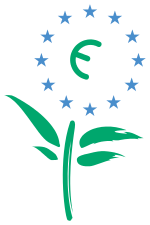European eco-label
The European Ecolabel ( Euroblume or EU Ecolabel for short ) is an international seal of approval for labeling consumer products and services. It was introduced with the EC regulation 1980/2000 / EC. The currently valid legal basis is Regulation (EC) No. 66/2010. Consumer goods that should be distinguished by their special environmental compatibility and comparatively low health impact are identified.
The award was introduced by the European Commission in 1992 and is now awarded independently by national institutes in the participating countries.
In June 2017 the EU Commission celebrated the 25th anniversary of the label with a temporary (pop-up) shop in Brussels .
Frequently tested products include B. mattresses, lights, wall paints, varnishes, paper as well as household and electrical appliances .
Award criteria
Prior to the introduction of which has European Union Ecolabelling Board (EUEB) (in German: Committee for the eco-label of the European Union, EUEB) on the basis of scientific studies a list of criteria set. The committee is composed on the one hand of the national awarding bodies of the participating countries, on the other hand of representatives of the interests of the industry, trade unions, environmental protection organizations and consumer protection associations.
To evaluate a product, not only individual features, but the entire product life cycle are used - including environmentally friendly production and disposal .
Euro flower in Germany
For testing and awarding the seal of approval in Germany these are German Institute for asset protection and labeling (RAL) and the Federal Environment Agency is responsible. Products and services are checked on request and receive the eco-label after a positive test, approval from the European Commission and conclusion of a license agreement .
In Germany, the seal of approval is awarded for three years.
Examples
When testing a light source for the German market, the energy efficiency is recorded , i.e. the relationship between luminosity and power consumption. The mercury content, packaging, usability , burning time and environmentally friendly disposal are also tested .
In Germany, detergents are currently awarded the European eco-label instead of the Blue Angel . A detergent bearing this symbol had to prove - in addition to its environmental compatibility - its washing power in strict tests. The criteria for this were developed by the German Federal Environment Agency .
EU Ecolabel in non-European countries
For certification with the EU Ecolabel, it is not absolutely necessary that the product or service in question is manufactured in an EU member state . Rather, it is necessary that the product or service be marketed in at least one EU member state. Thus, for example, accommodation companies from non-EU countries can also be certified with the eco-label, provided that they market their offer within the EU.
Web links
Individual evidence
- ↑ a b EC Regulation 1980/2000 / EC (PDF) . Retrieved June 22, 2009
- ↑ EUR-Lex - 02010R0066-20171114 - EN - EUR-Lex. Retrieved October 3, 2019 .
- ↑ Vincentz Network: Commission celebrates 25 years of the EU Ecolabel. In: Technical trade. Retrieved August 29, 2017 .
- ↑ Information brochure of the International Natural Textile Fair ( Memento of the original from September 23, 2006 in the Internet Archive ) Info: The archive link has been inserted automatically and has not yet been checked. Please check the original and archive link according to the instructions and then remove this notice. . InNaTex. Retrieved September 29, 2006
- ↑ ( Memento of the original from October 7, 2006 in the Internet Archive ) Info: The archive link was automatically inserted and not yet checked. Please check the original and archive link according to the instructions and then remove this notice. . In. label-online.de . Retrieved September 29, 2006.
- ↑ EU Ecolabel Euroblume ( Memento of the original from June 3, 2006 in the Internet Archive ) Info: The archive link was inserted automatically and has not yet been checked. Please check the original and archive link according to the instructions and then remove this notice. . In: thema-energie.de . Retrieved September 29, 2006
- ↑ Holiday apartments in Montenegro certified with the EU Ecolabel. In: utjeha.me. Retrieved December 18, 2013 .
